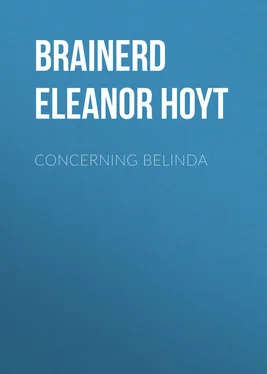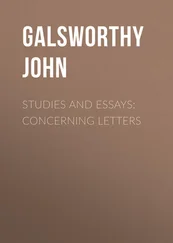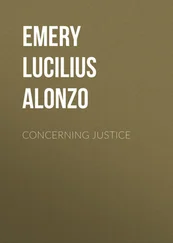Eleanor Brainerd - Concerning Belinda
Здесь есть возможность читать онлайн «Eleanor Brainerd - Concerning Belinda» — ознакомительный отрывок электронной книги совершенно бесплатно, а после прочтения отрывка купить полную версию. В некоторых случаях можно слушать аудио, скачать через торрент в формате fb2 и присутствует краткое содержание. ISBN: , Жанр: foreign_antique, foreign_prose, на английском языке. Описание произведения, (предисловие) а так же отзывы посетителей доступны на портале библиотеки ЛибКат.
- Название:Concerning Belinda
- Автор:
- Жанр:
- Год:неизвестен
- ISBN:http://www.gutenberg.org/ebooks/35008
- Рейтинг книги:3 / 5. Голосов: 1
-
Избранное:Добавить в избранное
- Отзывы:
-
Ваша оценка:
- 60
- 1
- 2
- 3
- 4
- 5
Concerning Belinda: краткое содержание, описание и аннотация
Предлагаем к чтению аннотацию, описание, краткое содержание или предисловие (зависит от того, что написал сам автор книги «Concerning Belinda»). Если вы не нашли необходимую информацию о книге — напишите в комментариях, мы постараемся отыскать её.
Concerning Belinda — читать онлайн ознакомительный отрывок
Ниже представлен текст книги, разбитый по страницам. Система сохранения места последней прочитанной страницы, позволяет с удобством читать онлайн бесплатно книгу «Concerning Belinda», без необходимости каждый раз заново искать на чём Вы остановились. Поставьте закладку, и сможете в любой момент перейти на страницу, на которой закончили чтение.
Интервал:
Закладка:
Concerning Belinda
AN APOLOGY
To all principals of New York boarding-schools, the author of these sketches offers humble apologies for having approached those excellent institutions chiefly from their humorous side.
That the city boarding-school has its earnest and serious phases, its charming and sensible pupils, no rational mortal could deny; but each finishing school has, also, its Amelias, and their youthful absurdities offer tempting material to the writer of tales.
CHAPTER I
BELINDA AND THE TWELVE
FOR years New York had been beckoning to Belinda. All during her time at the western co-educational college, where she collected an assortment of somewhat blurred impressions concerning Greek roots, Latin depravity, and modern literature, and assisted liberally in the education of her masculine fellow-students, New York, with its opportunities for work and experience, had lured her on. Fortune she would not need. Daddy had attended to that in his will, but success, and a knowledge of the world outside of Indiana, she must have.
This fixed purpose rendered her immune from the sentimental and matrimonial epidemics that devastate the Junior and Senior ranks in co-educational institutions. She graduated with honours – and with scalps. Many Seniors went away sorrowful because of her, the French professor lapsed into hopeless Gallic gloom, and even the professor of ancient history was forced into painful recognition of the importance of the moderns.
When the fortune which had seemed a premise in life's logic shrunk to proportions barely adequate to support the mother and the younger children, and became for Belinda herself a vague hypothesis, New York still hung mystic and alluring upon the horizon; but a public-school position in the home town offered solid ground upon which to stand, while yearning toward the apparently unattainable star. The public-school career was a success. The English classes attained unheard-of popularity; and, if the number of fights between the big boys swelled amazingly, at least the frays did not, as a rule, occur upon the school grounds, and the casualties were no more dire than those contingent upon football glory. Belinda shone for all. She allowed great and small to adore her. To her pupils she was just but merciful, and stoically impartial. The school superintendent, who had weathered the first throes of widowerhood, and reached the stage where he loved sitting upon a veranda in the twilight and hearing nocturnes played by some feminine personality in the parlour, suffered much emotional stress and strain in the endeavour to decide whether he would rather have nocturnes and a parlour-chained Belinda or a Belinda beside him in the twilight and no nocturnes.
Chopin eventually went to the wall; but, just as the superintendent was developing a taste for major harmonies once more, the unexpected happened.
Miss Lucilla Ryder came to town.
Miss Ryder was one of the Misses Ryder. Apart from the other Miss Ryder was incomplete, but she more nearly approximated completion than did Miss Emmeline Ryder under the same conditions.
Together, the elderly maiden sisters made up a composite entity of considerable force; and for something like thirty years this entity had been the mainspring of a flourishing Select School for Young Ladies, located upon a fashionable side street in the most aristocratic district of New York. To the school of the Misses Ryder youthful daughters of New York's first families might be entrusted, with no fear that their expensive and heaven-allotted bloom would be rubbed off by contact with the offspring of second-rate families. As Miss Lucilla Ryder explained, in an effort to soothe the natural fears of a society leader whose great-grandfather had been a most reputable farmer, the young ladies of the school were divided into groups, and the flowers of New York's aristocracy would find in their especial classes only those young ladies with whom they might reasonably expect to be intimate after their school life ended and their social career began.
Miss Ryder did not mention this interesting fact to the fond parents from Idaho and Texas who contemplated placing their daughters in the school, in order that they might acquire a New York lacquer, and make acquaintances among the social elect. In fact, Miss Ryder always dangled before the eyes of these ambitious parents a group of names suggesting a list of guests for the most exclusive of Newport functions, and dwelt eloquently upon the privilege of breathing the air which furnished oxygen to members of these exalted families. Nine times out of ten, mere repetition of the sacred names hypnotised the prospective patrons, and they gladly offered up their daughters upon the altar of social advancement.
An explanation of the class-system would have marred the optimistic hopes of these fond parents, and the Misses Ryder were too altruistic to disturb the happiness of fellow mortals. Moreover, it was a comparatively simple thing to separate day-scholars from boarders without appearing to make a point of it.
In the handling of such delicate matters, the Misses Ryder displayed a tact and a finesse which would have made them ornaments to any diplomatic corps; and, fortunately, the number of the young ladies who were, of necessity, to be kept in cotton wool was small. The great bulk of the school's attendance was more or less genially democratic.
School keeping in an aristocratic section of New York is an expensive matter. It must be done upon a large and daring scale. The Misses Ryder occupied two brownstone houses. The rents were enormous. The houses were handsomely furnished. Teachers of ability were a necessity, and such teachers were expensive. A capable housekeeper and efficient servants were required to make domestic affairs run smoothly. In consideration of all this, it was imperative that the Misses Ryder should gather in, each year, enough boarders to exhaust the room capacity of the two big houses, and that these boarders should be able and willing to pay high prices. In order to insure this condition of things, one of the two principals always made summer pilgrimages to remote places, where wealthy families possessed of daughters hungering for New York advantages might reasonably be supposed to exist; and it was in the course of one of these promoting tours that Miss Lucilla Ryder came to Lanleyville – drawn there by knowledge of certain large milling interests in the place.
It was – with apologies to Tennyson – "the miller's daughter" who was "dear, so dear," to Miss Lucilla, but an unkind fate had decreed that the miller's daughter should show a pernicious desire for college education, and that the miller himself should be as wax in his daughter's hands. Miss Lucilla did not find pupils in Lanleyville, but she found Belinda. That alone should have repaid her for the trip.
The meeting was accidental, being brought about through the aforesaid miller's daughter, who had been, for a High-School period, one of Belinda's adoring slaves.
The Misses Ryder needed a teacher of English; Belinda dreamed of New York. To make a long story short, Belinda was engaged to teach to the Ryder pupils such sections and fragments of the English branches as might be introduced into their heads without resort to surgery. The salary offered was meagre, but the work would be in New York; so the contract was made, and Belinda was inclined to look upon Miss Lucilla as angel of light. Miss Lucilla's opinion of the arrangement was summed up briefly in her next letter to Miss Emmeline.
"I have secured a teacher of English," she wrote. "The young person is much too pretty and girlish, but she is willing to accept a very small salary and is unmistakably a gentlewoman. Her attractions will give her an influence which we may be able to utilize for the benefit of the school."
Читать дальшеИнтервал:
Закладка:
Похожие книги на «Concerning Belinda»
Представляем Вашему вниманию похожие книги на «Concerning Belinda» списком для выбора. Мы отобрали схожую по названию и смыслу литературу в надежде предоставить читателям больше вариантов отыскать новые, интересные, ещё непрочитанные произведения.
Обсуждение, отзывы о книге «Concerning Belinda» и просто собственные мнения читателей. Оставьте ваши комментарии, напишите, что Вы думаете о произведении, его смысле или главных героях. Укажите что конкретно понравилось, а что нет, и почему Вы так считаете.












